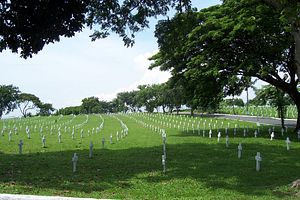The bitter taste left by the “hero’s” burial for former dictator Ferdinand Marcos, with outrage fueling protests, reveals deep divides between Filipino society and its ruling classes. Reflecting on the abuses of power during Marcos’ dark 21-year reign, including nine years under martial law, should lead to comparisons with the current strongman in the presidential palace.
Despite new President Rodrigo Duterte’s landslide victory on a wildly anti-establishment platform, Duterte supported Marcos’ burial in the national Heroes’ Cemetery, asking the country to “forgive” their long-time oppressor. The issue of Marcos’ final resting place, like Duterte’s so-called “drug menace,” was not of any major national concern less than a year ago. Marcos died 25 years ago. The only people the least bit concerned with the ghoulish idea of moving his corpse to lie alongside national heroes were a small but powerful cabal of Marcos-clan supporting elites.
From his rhetoric, you would be forgiven for expecting Duterte to have railed against such a public measure and such elitist forces. But as with most populist rhetoric, Duterte’s anti-elitism belies a cynical manipulation of existing fears. Duterte aimed his ire at some in the establishment, but not all. He has created a strong sense of resentment toward particular figures that dare to question his methods while creating new cronies and resurrecting old establishment figures.
Senator Alan Cayetano, Duterte’s running mate, who came third in the race for vice president, leads a group of new Duterte loyalists, including the fading boxing superstar Manny Pacquiao, also a senator. Duterte’s 28-year career in provincial politics, and 10 years prior in the state prosecutor’s office, makes him a member of the establishment, even if his gutter vocabulary masks his elitist position in Filipino society. But his provincial standing meant Duterte had to cozy up to established national figures for support — especially given that the vice presidential election resulted in victory for a potentially opposing force, Liberal party nominee Leni Robredo.
When former President Gloria Arroyo had her corruption charges dismissed in July, she had Duterte to thank. In return, she now supports his lawless war on drugs, which has resulted in thousands of extra-judicial killings and a growing chance of a warrant from the International Criminal Court. Furthermore Arroyo is now one of the notable voices leading the public lynching of Duterte’s only real opponent in Filipino politics, former Justice Secretary Leila De Lima. Arroyo and others (including Pacquiao) take turns smearing De Lima, threatening to show a sex tape in the Senate and accusing her of being a drug lord and running her drug empire from the country’s notoriously corrupt prisons.
Sandwiched somewhere between the ugly combination of Duterte’s new and old allies, the specter of the Marcos dictatorship has a very real political face — his son. Ferdinand Marcos Jr., known as Bongbong, narrowly lost the vice presidential election to Robredo by less than single percentage point. Bongbong’s ties to Duterte are hardly distant; only last month, whilst in China, Duterte said Marcos could be the next vice president if his legal challenge to the narrow election loss is upheld. The bond is a public allegiance that goes back a year to the beginning of the campaign, when Duterte said that Bongbong would take over if he failed to stop crime in three months.
Almost six months into his term, while the calamitous war on drugs has generated an obvious omertà from which few are able to speak out, Duterte has a gaping Marcos-shaped weakness. Through his relationship with Bongbong and support for the elder Marcos’ burial, it may not take much for ill sentiment to become public and realigned at the palace.
For very little political gain, perhaps only loyalty, Duterte has risked turning the outrage behind #MarcosNOTaHero into #Du30NOTaHero. While such a dramatic shift will surely take time, the longer the drug killings continue, the more likely the backlash is. Despite a life in politics Duterte has displayed a lack of political instinct in some of his calculations and a dangerous reckless streak, extending into international affairs.
The Marcos gamble has backfired already and brought the popular vice president into the public eye, with Robredo passive-aggressively shaming her boss on Twitter over the burial. With the president endorsing an authoritarian past, the Philippines has another stark warning of the future of a Duterte-led country. While held accountable for this protest, however, Duterte still has plenty of apologists to come to his aid. If the Marcos burial does not end up being the moment the tide changed, it will be another time a warning was missed.
Dr. Tom Smith is a Lecturer in International Relations for the University of Portsmouth based at the Royal Air Force College Cranwell. He specializes in terrorism, political violence, and insurgencies with a focus on Southeast Asia.

































